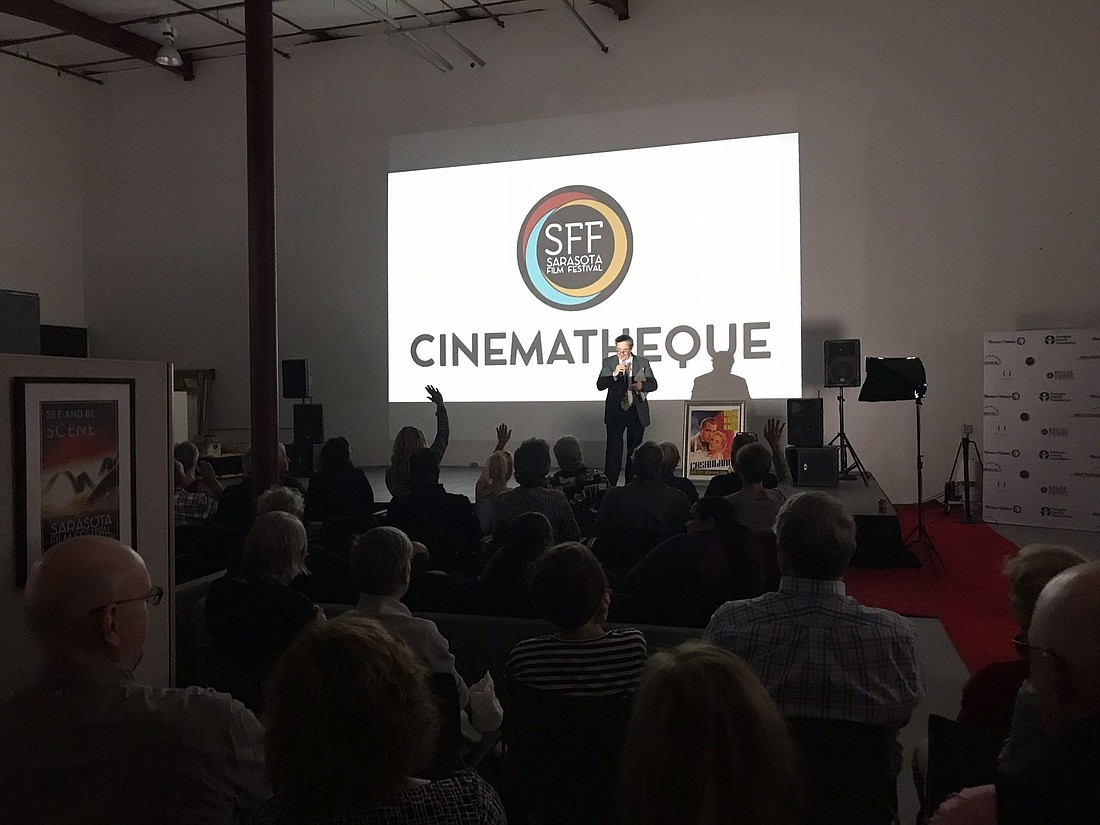- April 19, 2024
-
-
Loading

Loading

In an era when many Americans admit to avoiding the news, escapism becomes more and more prevalent in all aspects of culture. And what better way to distract from the realities of a divisive political and social climate than by going to the movies?
“Sarasota Film Festival wants to be seen as a year-round event,” says Paul Ratner, director of Education at the festival. "There's an audience for that."
SFF recently converted a warehouse at 500 Tallevast Road into a fully functioning movie theater with its own projection screen, red carpet, snacks, beverages and more. It was first used for the festival’s youth film camp programs, and now it’s open to the public every weekend for screenings of classic and foreign films under the SFF Cinematheque program.
Every screening kicks off with an introduction from a film historian and ends with a Q&A with said expert, who offers an inside look and shares fun facts about the filming process. The series kicked off with a screening of the 1942 classic “Casablanca” Dec. 1 with local cinephile and “At the Movies with Gus Mollasis” host Gus Mollasis.
The cinematheque is a French concept — the word literally translates to “film library” — defined by Merriam Webster as “a small movie house specializing in avant-garde films,” but Ratner says SFF’s theater is committed to showing more than just cinematic masterpieces. SFF Cinematheque plans to hopefully feature cult classics like “Rocky Horror Picture Show” and a variety of family-friendly films.
He says SFF is currently trying to obtain grants to expand the program’s offerings, focusing it as an educational tool that will hopefully be incorporated into the curriculum of local film teachers. If the organization receives the additional funds from grants, SFF will likely add a weekly matinee showing around noon and try to get the rights to even more films.
“Matinees would be oriented towards families and kids,” Ratner adds. “Showing films like 'Lassie' and 'Flipper' — family classics that fewer kids are seeing these days.”
But what do these movies actually bring to the local art community? Ratners says they’re filling a hole in the cultural composition of Sarasota that not even the film festival itself can fill. New film (which SFF’s two-week festival consists of) pushes the arts community forward, but all good filmmakers turn to classic cinema for inspiration before they can create something meaningful.
That experience shouldn’t be on a phone or laptop screen, he adds.
“Movies like ‘Citizen Kane’ have (a level of) cinematography that was made for the big screen,” Ratner says. “Younger generations are used to watching on small screens, but you don’t ‘get it’ on a smaller screen.”
This is where the moderator for the pre and post-show discussions comes in. Having a moderator to tell you what to look for — unusual camera angles, subtle motifs, editing techniques, etc. — when watching and to gain background knowledge from after watching the film helps audiences gain a full appreciation for artistic movies, Ratner says, especially those that are harder to grasp such as the Jan. 26 screening, “Andrei Rublev.”
Many people haven’t heard of the 1966 Russian drama, but Ratner says “Andrei Rublev” is one of the best spiritual movies ever made, and with the additional knowledge of Director Andrei Tarkovsky’s intentions, audiences will leave with a greater appreciation for the movie.
“Left to your own devices you might not understand it,” Ratner says of the complex film.
The post-film talk after every screening is not only a Q&A with the moderator but an open discussion in which audience members can compare their impressions of the film, Ratner adds, making for a more engaged community of filmgoers.
Ratner’s vision is for SFF Cinematheque to eventually organize several series, such as a collection of dance films featuring icons like Gene Kelly and Fred Astaire, and exciting events like silent film screenings accompanied by live music.
But whatever SFF screens, the mission will remain the same.
“Introducing the history of cinema to the community is the goal,” Ratner says. “...to help them fall in love with movies that are meant to be seen this way.”